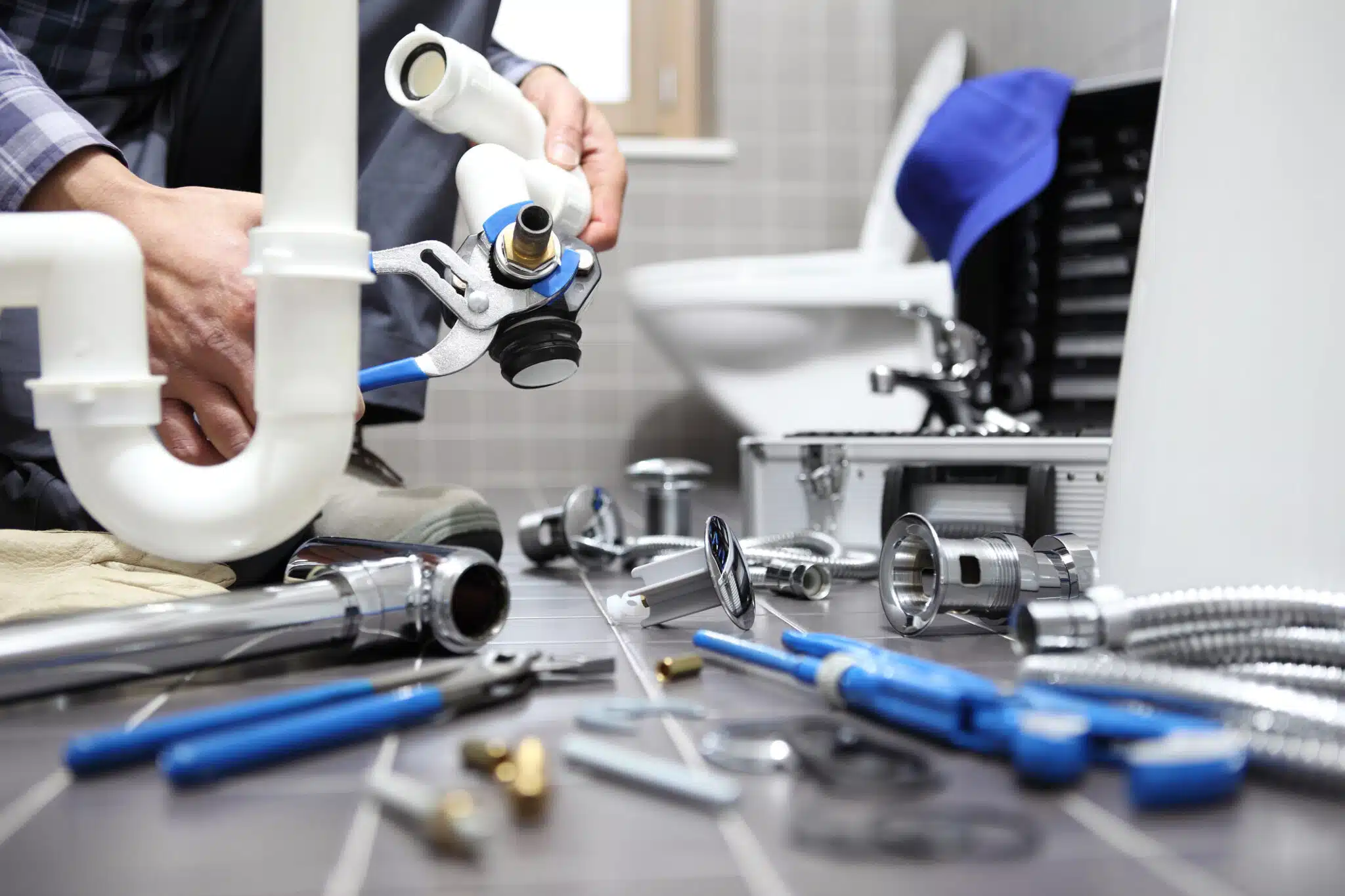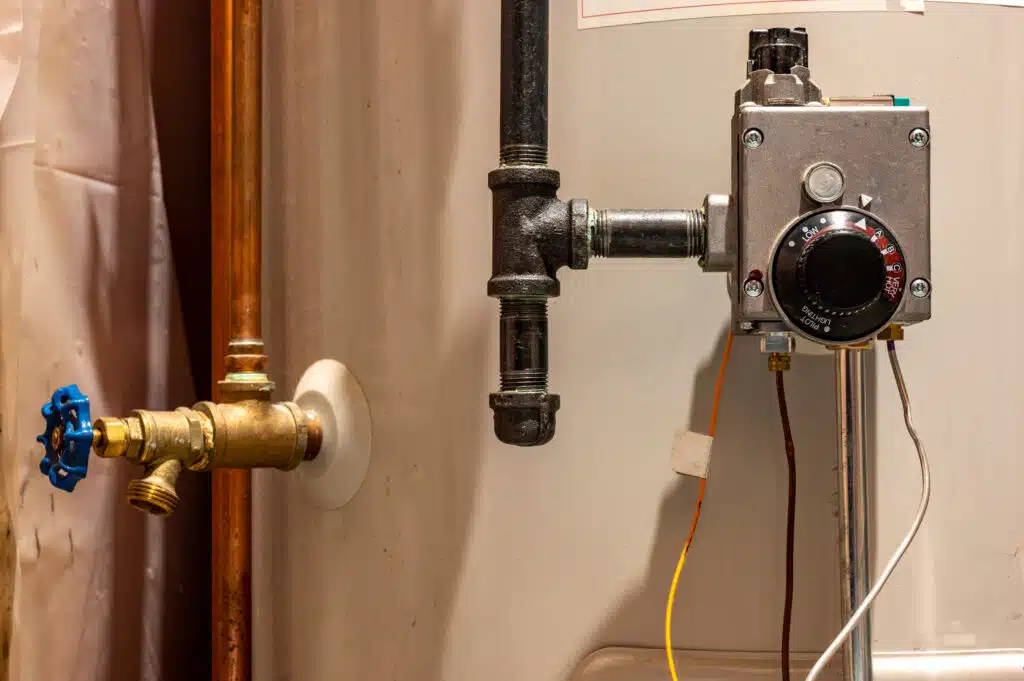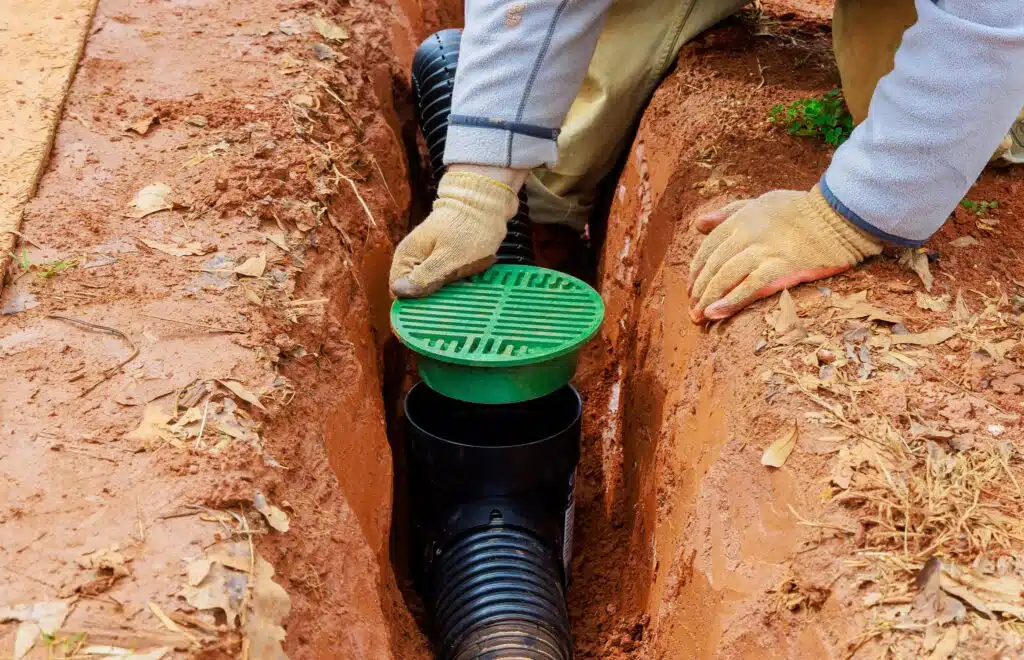A plumbing system plays a crucial role in your home’s functionality, ensuring clean water flows efficiently through pipes and fixtures. However, if you live in an area with hard water, like Lancaster, PA, our system may be at risk of long-term damage. Hard water contains high levels of minerals such as calcium and magnesium. Over time, these minerals accumulate inside pipes, appliances, and fixtures, leading to inefficiencies, clogs, and costly repairs.
Many homeowners underestimate the effects of hard water, assuming it’s just a minor inconvenience. However, mineral buildup can cause significant problems, including reduced water pressure, pipe corrosion, and damage to water heaters and appliances. Without proper maintenance, hard water can shorten the lifespan of your plumbing components, leading to expensive replacements.
Understanding how hard water affects your plumbing is the first step in protecting your home. In this guide, we’ll explore the impact of hard water, common warning signs, and effective solutions to keep your plumbing system running smoothly. Whether you’re experiencing scale buildup or frequent clogs, addressing hard water issues early can save you money and prevent unexpected plumbing failures.
What Is Hard Water?
Hard water is water that contains high concentrations of dissolved minerals, primarily calcium and magnesium. These minerals enter the water supply as it flows through limestone, chalk, or gypsum deposits underground. The higher the mineral content, the harder the water. Many regions, including Lancaster, PA, have naturally hard water due to the geology of the area.
Unlike soft water, which lacks significant mineral content, hard water leaves behind residue when it evaporates. This is why you might notice white spots on dishes, soap scum in showers, or mineral deposits around faucets. While hard water is generally safe to drink, it can cause major issues for your plumbing system over time.
One of the biggest problems with hard water is that it reduces the efficiency of soaps and detergents. The minerals interfere with lathering, making it harder to wash dishes, clothes, and even your skin. Over time, this inefficiency can lead to clogged pipes, reduced water pressure, and damage to household appliances. Understanding the composition of hard water is the first step in recognizing its effects on your home’s plumbing.

How Hard Water Affects Your Plumbing System
Hard water might seem harmless, but over time, it can wreak havoc on your plumbing system. The minerals in hard water, primarily calcium and magnesium, don’t just dissolve as water flows. Instead, they accumulate inside pipes, faucets, and appliances, forming deposits known as scale buildup. This buildup can lead to reduced water flow, inefficient plumbing performance, and expensive repairs.
Below, we’ll explore the different ways hard water impacts your plumbing and why regular maintenance is essential to prevent long-term damage.
Scale Buildup Restricts Water Flow
One of the most noticeable effects of hard water is reduced water pressure. As minerals settle and harden inside pipes, the space for water to flow becomes narrower. This restriction forces your plumbing system to work harder to deliver water, leading to several issues:
- Weak water pressure from faucets and showerheads – When scale builds up inside your pipes, less water can flow through, resulting in lower water pressure. Over time, this can make showering or filling a sink take longer than usual.
- Slower drainage due to partial blockages in pipes – Hard water deposits can accumulate in drain pipes as well, making it difficult for water to pass through. This can lead to slow-draining sinks and bathtubs, which often get worse over time.
- Increased strain on pumps and water supply systems – Plumbing systems with restricted water flow have to work harder, which can put excess pressure on your home’s water pump or municipal supply. This can lead to higher energy usage and a reduced lifespan for these components.
If left unaddressed, scale buildup can lead to complete blockages, requiring professional descaling or even pipe replacements.
Corrosion Weakens Pipes Over Time
While mineral buildup is a major concern, hard water can also accelerate pipe corrosion. Metal pipes, especially older ones made of galvanized steel or copper, react with the minerals in hard water, leading to rust and deterioration. This can cause:
- Discolored or rusty water coming from faucets – If your tap water has a brown or reddish tint, it could be a sign that your pipes are corroding from the inside. This not only affects water quality but can also stain sinks, tubs, and clothing.
- Frequent leaks or burst pipes – Corroded pipes become weak and brittle over time, making them more prone to developing leaks. In severe cases, sections of pipe can burst, leading to costly emergency repairs and potential water damage.
- A metallic taste in drinking water – As pipes break down, rust and other contaminants may enter your water supply, altering its taste. If your tap water has a metallic or unpleasant flavor, it may be time to have your plumbing inspected.
Corroded pipes not only compromise water quality but also weaken the structural integrity of your plumbing system, increasing the risk of costly failures.
Hard Water Damages Plumbing Fixtures
Your faucets, showerheads, and valves are also vulnerable to hard water damage. As mineral deposits accumulate, they create a white, chalky residue that can cause various problems:
- Clogged showerheads, reducing water flow – Over time, mineral buildup can block the small holes in showerheads, preventing water from flowing freely. This can lead to uneven spray patterns or a noticeable reduction in water pressure.
- Dripping faucets caused by damaged seals and washers – The minerals in hard water can cause rubber washers and seals inside faucets to wear out faster. As these components degrade, you may notice persistent leaks, which can waste gallons of water and increase your utility bills.
- Unsightly stains on sinks, bathtubs, and toilets – Hard water leaves behind stubborn stains that are difficult to remove. These mineral deposits can make your bathroom and kitchen fixtures look dirty, even when they are clean.
Even high-quality fixtures can wear out faster when exposed to hard water. Regular cleaning and maintenance can help slow the buildup, but professional treatments may be necessary to restore full functionality.
Pipe Corrosion and Scale Buildup
Hard water doesn’t just affect water pressure, it also contributes to pipe corrosion and scale buildup, two major threats to your plumbing system. As water flows through pipes, calcium and magnesium settle along the inner walls. Over time, these deposits harden, restricting water flow and increasing the risk of blockages.
Scale buildup is especially problematic for older homes with metal pipes. Unlike modern PVC or PEX piping, metal pipes react with the minerals in hard water, accelerating corrosion. This can lead to rust, leaks, and, in severe cases, pipe failure. Corroded pipes not only compromise water quality but also weaken the overall plumbing infrastructure.
Beyond pipes, scale deposits can clog valves and fixtures, leading to inefficient water distribution. You may notice sputtering faucets, inconsistent water temperatures, or frequent leaks. These are all signs that mineral buildup is impacting your system’s efficiency.
Addressing scale buildup early can prevent costly repairs. Regular plumbing maintenance and water treatment solutions, like water softeners, can help reduce mineral accumulation. In the next section, we’ll explore how hard water affects water heaters and why it’s one of the most vulnerable parts of your plumbing system.
Hard Water and Your Water Heater
Your water heater is one of the most vulnerable parts of your plumbing system when it comes to hard water damage. Because water heaters continuously heat and store water, they create the perfect environment for mineral deposits to accumulate. Over time, calcium and magnesium settle at the bottom of the tank, forming a thick layer of sediment.
This buildup reduces the efficiency of your water heater by acting as an insulating barrier. When heating elements have to work harder to warm the water, energy consumption increases, leading to higher utility bills. In extreme cases, sediment buildup can cause overheating, triggering system failures or even permanent damage.
Tankless water heaters are not immune to hard water problems either. Although they don’t store water, mineral deposits can clog internal components, reducing performance and shortening the unit’s lifespan. If you notice fluctuating water temperatures, unusual noises, or a slower hot water supply, hard water may be to blame.
Regular flushing and maintenance can help prevent sediment buildup, but the best way to protect your water heater is by addressing hard water at its source. In the next section, we’ll discuss how mineral deposits impact your faucets, sinks, and household appliances.
Damage to Fixtures and Appliances
Hard water doesn’t just affect pipes and water heaters, it also leaves its mark on household fixtures and appliances. If you’ve ever noticed white, chalky residue on faucets, sinks, or showerheads, that’s a sign of mineral buildup from hard water. Over time, these deposits can cause faucets to leak, showerheads to clog, and sinks to develop stubborn stains that are difficult to remove.
Beyond fixtures, hard water also takes a toll on appliances that rely on a steady water supply. Dishwashers, washing machines, and coffee makers are particularly vulnerable. Mineral deposits can clog internal components, reducing efficiency and increasing the likelihood of breakdowns. If your dishwasher leaves spots on glassware or your washing machine struggles to rinse detergent properly, hard water may be the culprit.
Soap and detergent also don’t work as effectively in hard water. The minerals interfere with lathering, leaving behind a filmy residue on dishes, clothes, and even your skin. Over time, this can lead to dingy laundry, soap scum buildup in showers, and dry, irritated skin after bathing.
Protecting your fixtures and appliances from hard water damage requires regular maintenance and preventative measures. In the next section, we’ll explore how frequent plumbing repairs and maintenance become necessary when hard water goes untreated.
Increased Plumbing Repairs and Maintenance
Ignoring hard water issues can lead to frequent plumbing repairs and higher maintenance costs. As mineral deposits accumulate inside pipes and fixtures, they create blockages that strain your plumbing system. This extra pressure increases the risk of leaks, bursts, and premature wear on essential components.
One of the most common hard water-related plumbing issues is clogged pipes. When scale buildup narrows pipe openings, water flow is restricted, causing reduced pressure and potential backups. In severe cases, blockages can lead to complete pipe failure, requiring costly repairs or replacements.
Hard water also accelerates wear on plumbing components like faucets, showerheads, and valves. Deposits can cause rubber seals to deteriorate, leading to persistent leaks. Even minor leaks can waste gallons of water over time, increasing your utility bills and causing potential water damage to your home.
Regular plumbing inspections and maintenance can help identify hard water damage before it becomes a serious issue. Professional plumbers can flush out buildup, replace worn parts, and recommend solutions to extend the lifespan of your plumbing system. In the next section, we’ll discuss the best ways to protect your home from hard water damage.
How to Protect Your Plumbing System from Hard Water
Preventing hard water damage starts with proactive solutions that minimize mineral buildup in your plumbing system. One of the most effective ways to combat hard water is by installing a water softener. These systems use ion exchange technology to remove calcium and magnesium from the water, reducing scale deposits and extending the life of your plumbing components.
In addition to water softeners, whole-house water filtration systems can further improve water quality. These systems help remove sediment, chlorine, and other impurities that may contribute to plumbing wear and tear. Regularly replacing filters and maintaining these systems ensures they continue to function effectively.
Routine plumbing maintenance is also key to preventing hard water issues. Flushing your water heater at least once a year helps remove sediment buildup, improving efficiency and prolonging its lifespan. Cleaning showerheads and faucets with vinegar solutions can dissolve minor mineral deposits before they become a bigger problem.
If you suspect hard water is affecting your home, scheduling a professional plumbing inspection is a smart step. A plumber can assess your plumbing system, recommend the best water treatment solutions, and perform any necessary repairs to prevent long-term damage. In the next section, we’ll explore why professional plumbing services are essential for managing hard water problems.
Why Professional Plumbing Services Are Essential
While DIY maintenance can help manage minor hard water issues, professional plumbing services provide long-term protection for your plumbing system. Licensed plumbers have the expertise to identify early signs of mineral buildup, corrosion, and inefficiencies that homeowners might overlook.
One major advantage of hiring a professional is their ability to assess your water quality and recommend the right treatment solutions. Whether it’s installing a water softener, flushing your water heater, or inspecting your pipes for scale buildup, a plumber ensures that your system remains in top condition.
Regular plumbing maintenance also prevents costly emergencies. Plumbers can clean out clogged pipes, replace worn-out fixtures, and check for leaks before they turn into major problems. This proactive approach saves you money on repairs and extends the lifespan of your plumbing system.
If you live in Lancaster, PA, where hard water is common, scheduling routine plumbing checkups is especially important. A trusted plumbing service, like Benjamin Franklin Plumbing of Lancaster, PA, can help protect your home from the long-term effects of hard water. In the next section, we’ll answer some frequently asked questions about hard water and plumbing maintenance.

FAQs
1. How can I tell if I have hard water in my home?
Signs of hard water in your plumbing system include white mineral deposits on faucets, soap scum in showers, and spots on glassware. You may also experience reduced water pressure due to scale buildup inside pipes. Appliances connected to your plumbing system, like dishwashers and washing machines, may wear out faster.
2. Can hard water permanently damage my plumbing system?
Yes, long-term exposure to hard water can lead to scale buildup, pipe corrosion, and reduced efficiency in water heaters and appliances. If left untreated, mineral deposits can cause costly repairs or even require pipe replacements.
3. What’s the best way to prevent hard water damage?
Installing a water softener is the most effective way to protect your plumbing system from mineral buildup. Regular maintenance, such as flushing your water heater, helps prevent sediment accumulation. Cleaning faucets and showerheads with vinegar-based solutions can also reduce minor scale deposits.
4. How often should I have my plumbing system inspected?
It’s recommended to have your plumbing system inspected by a professional at least once a year. Regular checkups help detect early signs of scale buildup, leaks, or corrosion. A plumber can assess your pipes, fixtures, and water heater to ensure your plumbing system functions efficiently.
5. Are water softeners worth the investment?
Absolutely. Water softeners protect your plumbing system, improve appliance efficiency, and reduce soap and detergent waste. While there is an upfront cost, the long-term savings on repairs, energy bills, and replacements make it a worthwhile investment.





















